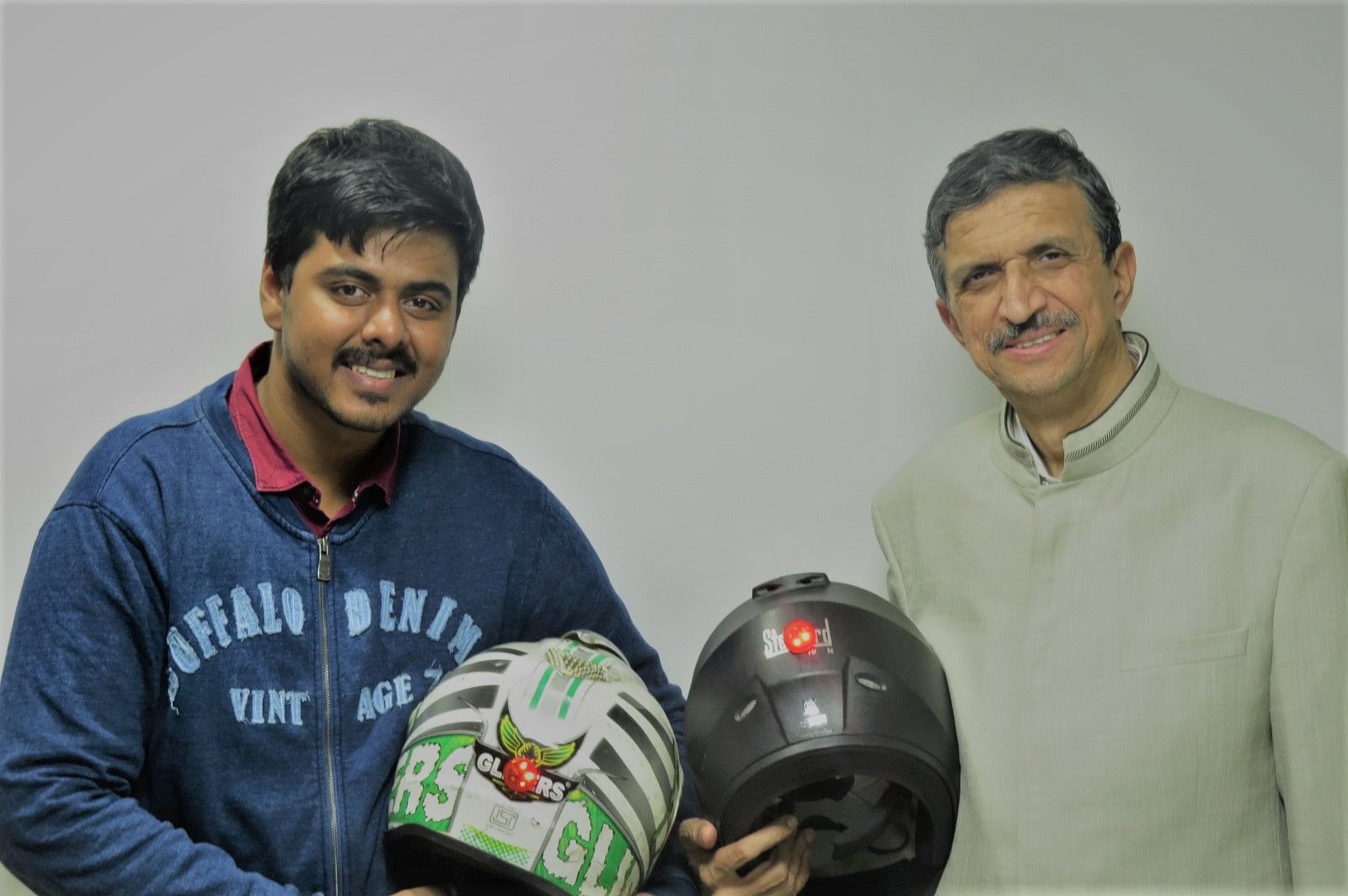Start-ups innovate to enhance helmet safety quotient
Helmets enhance safety for everyone on two wheels. Now two NCR-based start-ups are taking the life-saving kit a notch further with hi-tech features that enable timely accident alerts and an in-built filter that makes breathing easy in polluted environs.
They say necessity is the mother of invention. In this case, it is safety that became the mother of innovation. Though wearing helmets while riding motorcycles became compulsory in the 1970s, their role in terms of a safety gear has not evolved much. Two-wheelers continue to be amongst the most unsafe modes of transport globally, more so in India.
A British physician, Dr Eric Gardner, created the basic canvas and shellac helmets in 1914 in association with Mr Moss from Bethnal Green, after they observed frequent cases of head traumas and injuries around the Brooklands race track. The design was soon presented before the Auto-Cycle Union, and they became mandatory at the Isle of Man TT Races in 1914.
Though it significantly reduced the number of concussions, it was only in 1935, after a British soldier, TE Lawrence (popularly known as Lawrence of Arabia) met with a fatal accident, further innovations were considered. It was much later (in the 1950s), that full-face crash helmets came into being.
In the India context, the importance of safety features and accessories, like a helmet, is more than anywhere else. That's because India sees the maximum number of road fatalities — 151,417 lives in 2018 — annually. Around 36.5 percent — over 55,000 of them — are two-wheeler users. Given the exposed nature of two-wheeler riding, this type of motorists is also more vulnerable to health hazards. Here's where the helmet can play a crucial role.
Two Noida-based start-ups have come up with innovations for helmets, which can make a difference to the lives of two-wheeler riders and pillions.
Retrofitting safety tech the Vida Salvateur way
Imagine the number of lives that could be saved if help reached them at the right time or if their relatives were able to locate the whereabouts of their near and dear ones in case of an unfortunate mishap? Well, this is exactly what a small device from Vida Salvateur tries to offer.
L-R: Vida Salvateur co-founders Prateek Kumar and Dr Manoj Kumar Saxena. The coin-sized device detects an accident using sensors and triggers an alert to emergency and medical services.
In 2018, Prateek Kumar and Dr Manoj Saxena developed a smart device that can be retrofitted to any helmet. Upon detecting an accident with great accuracy, it sends out an SOS signal. The name of the company — Vida Salvateur — literally means life-saving. The term, ‘Vida’ stands for life in Spanish and ‘Salvateur’ French for ‘saving’. According to Prateek Kumar, the device "is also equipped with a smart rear light, which increases the visibility of the helmet user. The device, with the help of On-Edge AI, is able to give advance riding analytics to the rider, indicating the average speed, lean angle as well as riding profile (safe, rash or unsafe riding)."
While Kumar has a B-Tech from the Delhi College of Engineering, Dr Manoj Saxena has a PhD in AI (Artificial Intelligence) from IITD, IISc, Stanford University and is also a gold medallist from DCE and an industry veteran.
Vida Salvateur's coin-sized device can be easily attached to any helmet, irrespective of the make. Kumar explains they are "using a proprietary combination of sensors equipped with machine learning models that helps to differentiate between an accident and the jerks on the road accurately. We have also applied for the patent more than a year ago."
The start-up, at present, is in advanced talks with a last-mile delivery operator for its fleet. Vida Salvateur is targeting a less than Rs 1,300 price range for the safety tech device and is also looking to tie up with helmet manufacturers to offer the solution as a package.
The product is expected to be launched in India by March 2020. Kumar adds that Vida Salvateur is also "looking at HUD integration, automatic sleek cooling system and fatigue detection in our product."
Every breath you take. . .
The menace of severe air pollution is enveloping all traffic grid-locked metros and fast-expanding cities in India, and two-wheeler riders are forced to inhale the poor-quality air around them. In fact, if you are in Delhi, a rider’s plight becomes even more severe. That's what led to the inception of Shellios, which is a brainchild of two New Delhi residents and co-founders — Amit Pathak and Mayank Pathak. They conceptualised it during the intense smog in 2016 when the air quality index (AQI) shot up to 1,000 versus a healthy reading of 0-50. Amit recollects how "the idea behind Shellios started off as a joke, when one of us remarked that it would be interesting to bring cylinders of pure air from Swiss Alps and sell it to Delhi residents."

Concerned by the growing pollution levels in Delhi, Shellios co-founders Mayank and Amit Pathak developed an in-built air ventilation system in helmets, enabling a flow of clean air to riders.
The discussion led to the thought behind the vulnerable two-wheeler users, who didn't have any alternative but to breathe the toxic air during the course of their commute. Rider safety married to rider convenience — this is how the idea "converged towards a helmet with an air purifier unit in it", which led to Puros being conceived.
The company began developing the prototype in 2017 and went through multiple iterations. According to Amit, "the current version of the product got certified in the latter part of 2018. We conducted a B2C pilot in 2019." For the B2C pilot, the company had priced Puros helmet at Rs 3,900.
The Puros, referred to by Shellios as an anti-pollution helmet, comprises a specially designed HEPA filter, a fan to pull air through the filter and circulate it to inside of the helmet. It is powered by a rechargeable battery, which can be charged using an Android-style port. The filter can be self-serviced by the customer once it gets clogged with particulate matter and dirt.
Amit says, "We believe that the top 5-10 percent demographic would be a target market for an invention such as this. Cost optimisation can lead to larger market adoption in the future."
Helmets have been around for over a century now and a WHO study indicates that they have been instrumental in decreasing the risk and severity of injuries among motorcyclists by about 70 percent, and the likelihood of death by almost 40 percent. With innovations like this, it is time to redefine their role.
RELATED ARTICLES
RSB Group Prepares for Hyper-Growth: New Markets, Tech and Mission ₹10,000 Cr
From a small workshop in Jamshedpur to an engineering group with global reach, RSB Transmissions is preparing for its mo...
Beyond Helmets: NeoKavach Wants to Make Rider Airbags India’s Next Safety Habit
As premium motorcycles proliferate and riding culture evolves, an Indo-French venture is betting that wearable airbags, ...
Inside Mahindra Last Mile Mobility’s Rs 500 Crore Modular Platform Strategy
Mahindra Last Mile Mobility has launched the UDO, an electric three-wheeler built on a new Rs 500-crore modular platform...






 23 Jan 2020
23 Jan 2020
 13613 Views
13613 Views









 Darshan Nakhwa
Darshan Nakhwa



 Shahkar Abidi
Shahkar Abidi

